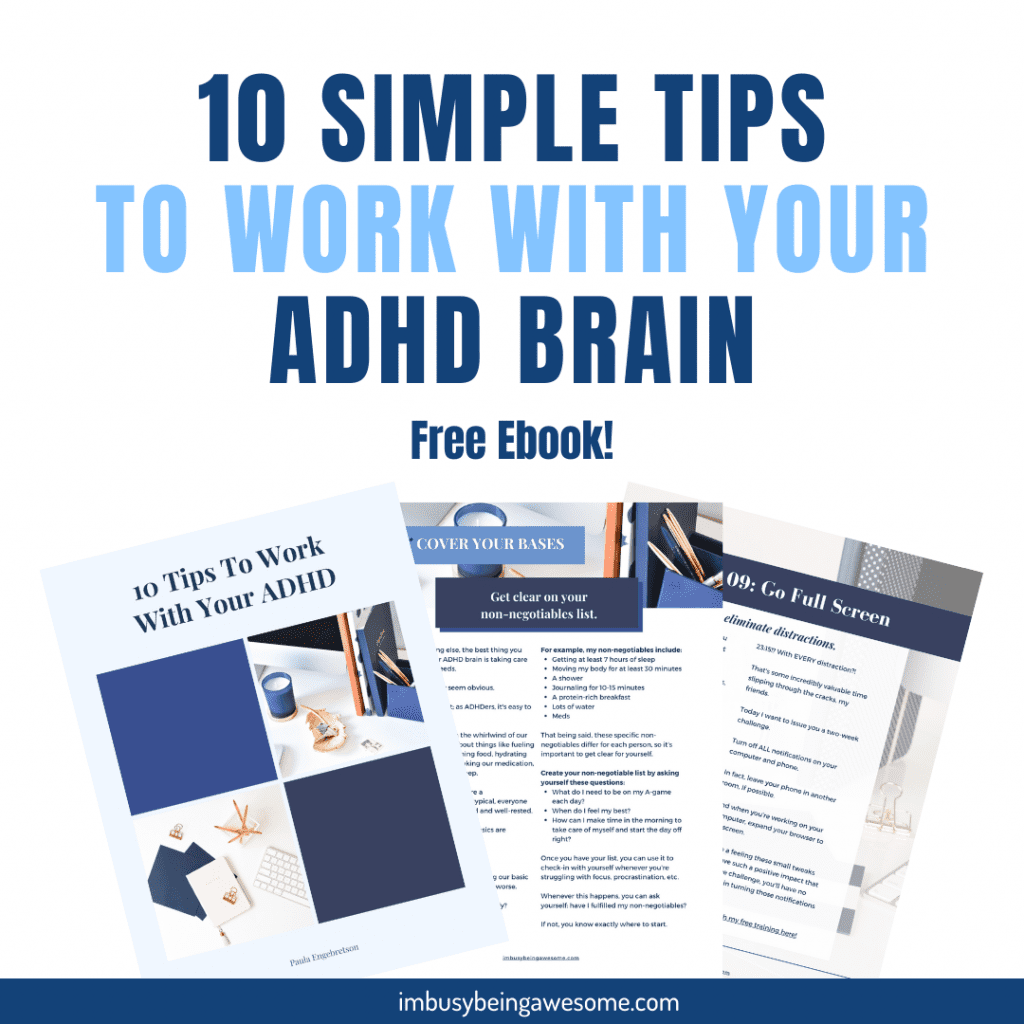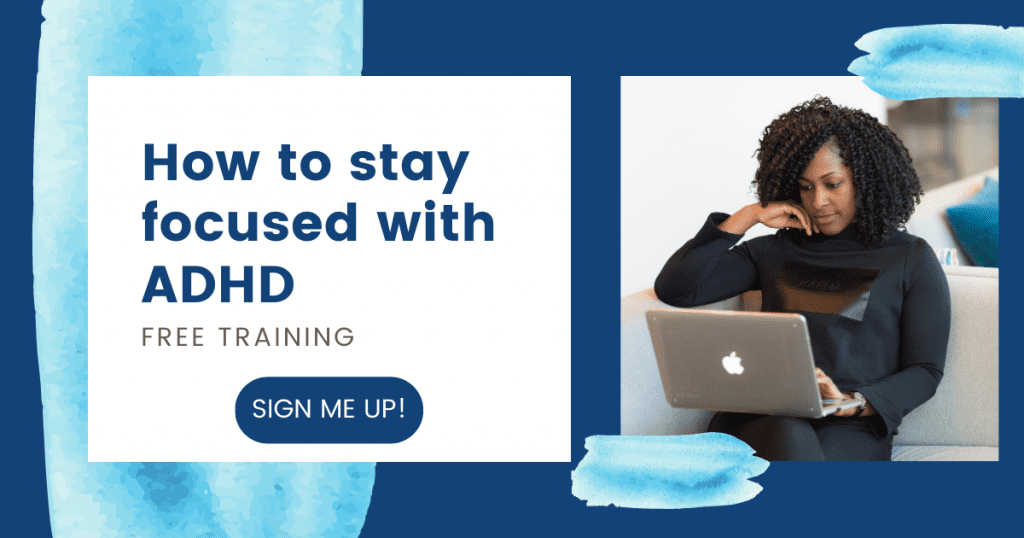I never finish anything; why is it so hard for me to follow through on projects? This question often comes up in the ADHD brain; it’s certainly one that used to haunt me.
Let’s be real; follow-through can be a big challenge for the ADHDer, and there are several different reasons contributing to this obstacle.
In episode 141 of the I’m Busy Being Awesome podcast, I share the top five obstacles that follow-through can be hard when you have ADHD.
And then we discuss strategies you can implement today to help you get out of the spin cycle and officially check the thing off your list.
You can listen to the episode above or stream it on your favorite podcasting app here:
Prefer to read? No problem! Keep scrolling for the entire podcast transcript.
In Episode 141: 5 Reasons Follow Through is Hard with ADHD, You Will Discover…
- Why we struggle with finishing tasks
- The top five obstacles that keep ADHDers from following through
- What you can do today to help you finally check those projects off your list.
Subscribe To I’m Busy Being Awesome & Give Us A Review!
Do you want to be the first to know when a new episode drops? You got it! Click over to iTunes, select “Listen on Apple Podcasts,” and then click the “subscribe” button.
Also, if you love the podcast, would you be a rockstar and leave me a review? Reviews help others find the show and allow me to share my message even further. Thanks, friend!

Episode #141: I Never Finish Anything: 5 Reasons Follow Through Is Challenging For ADHD (Transcript)
Today I’m excited to talk with you about the topic of follow-through, which was inspired by several of your comments on an Instagram post I shared a few weeks ago.
And by the way, if we’re not connected on Instagram yet, we totally should be. I’m @imbusybeingawesome, so head over and let’s connect.
So, I posted the below image on Instagram, which was a poll asking…
“What’s your biggest obstacle when it comes to getting things done? And it included Planning my day, Starting the plan, and Following through.”
The two most popular answers were planning my day and following through.
But, the most popular was the latter following through.
When it comes to Follow Through and ADHD, People Mentioned:
- How easily distracted they felt
- They’d map things out with a beautiful plan, start strong, and then suddenly everything would fall apart
- They get easily distracted by unimportant things and then forget to follow through on the most important things that would move them forward.
In other words, so many of us struggle with the process of following through on projects, tasks, and goals. It’s a common obstacle for all brains, and this is especially challenging for those of us with an ADHD brain or ADHD tendencies.
Why is Follow Through So Difficult?

Why is it so challenging to complete the thing?
This episode 141 of The I’m Busy Being Awesome podcast, we’re discussing just that.
Let’s start by diving into five key obstacles that seem to get in the way and prevent us from following through on our plans and what we can do to support ourselves.
5 Common Obstacles to Following Through
What are the most common obstacles that we come up against when following through on something?
As I mentioned, I see five main areas including:
- The distraction and allure of new ideas.
- Your brain is offering that the task you’re working on is so tedious and you’re completely bored of it
- Perfectionism. We keep tweaking and perfecting and never actually complete the thing.
- Impostor syndrome, which we talked a little bit about last week. But essentially, you’re worried about completing and sharing your work out because people might “find out” you’re an imposter or don’t know what you’re doing.
- Fear of failure or fear of success.
Do any of these reasons stand out to you? For the ones that do, ask yourself, how can I implement this strategy to move forward sometime this week?
I am putting both fear of failure and fear of success into the same category, and I think it will make sense when we dive into each category more specifically.

Obstacle #1. Distraction and New Ideas
Many of you can relate to the topic of distraction and new ideas.
In fact, it’s why I did that entire podcast on brilliant ideas several weeks ago now. As I mentioned, we are idea machines. We have so many brilliant ideas constantly flooding our minds, and after we’ve put so much energy and effort into one project, our brain is ready for something new.
When we have this constant barrage of new concepts and ideas that completely light us up, it can seem very challenging to stick with the same thing you’re working on even longer.
I will offer a slightly different approach to support yourself from the suggestions I made in that episode. This is the importance of remembering and recommitting to why you started your original project in the first place.
Why did you start this? Why were you SO dedicated to it? There’s a reason you got it as far as you have. Spend some time reminding yourself of the reason.
Then think about how incredible you will feel as the person who sticks with it all the way through.
Use your brilliant ideas list, record your ideas, and then remind yourself of your commitment, your bigger “why” of why it’s important to you, and how you’ll feel when you’re done as you dig back into the project and follow through to complete it.
Obstacle #2. You’re Completely Bored of the Task at Hand
The second reason why we struggle with following through is that it’s often that last 20% of the project that seems so tedious, right?
We’ve been working on a project. We’ve done all the planning and we’ve managed to overcome all of the big hurdles. Now it’s the detail work, and we just want to be done with it. We just want to wrap it up with a bow, call it done, and move on to something new.
The brain – especially the ADHD brain – has a hard time maintaining that focused attention on tedious or boring things.
As ADHDers, we lack the appropriate levels of dopamine and norepinephrine in our brain, which makes it so much harder for us to maintain that focus and dedication to specific projects and tasks that aren’t of interest.
We don’t have that extra boost of dopamine to fuel our commitment.
The good news is there are things we can do to support ourselves – even when that last 20% seems like the biggest obstacle yet. And you can use these strategies on both a big and a small scale. So I’ll give examples for both.
Example: On a Small Scale
I am not a huge fan of putting away laundry. But the thing is, I don’t actually mind doing the laundry. I don’t mind the process of it. In fact, I’m perfectly happy with the first 80%.
I bring the laundry down to the basement where the machines are and I throw it in the wash machine. I put it in the dryer after the wash cycle completes and most of the time I even remember to START the dryer. And on good days, I even pull my clothes out of the dryer at some point and fold them or hang them on hangers. But then I tend to stop.
I usually have some sneaky thoughts like, “I’ll deal with the rest later.” “I’ve already put in so much work or time, I’ll just finish up later.” And those are the infamous words that otherwise challenge my laundry routine. I’m almost done – I just need to bring the clothes upstairs and put them away. But they’ll sit in the basement for days.
Now for you, it might not be laundry, but it could be opening the mail, breaking down the amazon boxes, putting the dishes in the empty dishwasher rather than the sink, etc.
Example: On a Larger Scale
When I was finishing my book in the spring of 2020, I truly kept thinking that I was done. But then my editor kept asking for more stuff. And every time, my mind was blown.
I really, truly thought that I had reached completion. I thought to myself, I did the research. I wrote the book. What else do you want from me?
It turns out they wanted things like an acknowledgment section and copyright permissions for the music examples. They wanted all of these tiny details that I both didn’t have on my radar nor did I want to make time for them because THEY WERE SO BORING.
I had no desire to do them.
That tiny detail work is my kryptonite. My brain was complaining constantly about how it was so tedious and boring and it was a full-on toddler tantrum for much longer than I’d like to admit. Because I kept avoiding these details, I ultimately kept dragging out the project even further, which made it take even longer than it needed to take.
Needless to say, don’t follow these steps. Learn from my mistakes! What can we do if we have boredom keeping us from the detailed work?
solutions to Finish the Last 20%
Gamify The Process
One of the things I love to do with situations like this is to find ways to gamify the process and make the thing fun. I ask myself, “okay, how can I introduce more fun to this? What can I do to make this fun or engaging in SOME way?”
With my laundry, I’ll gamify the situation by cueing up a playlist or a short podcast episode and see if I can get everything done and put away before the podcast or playlist ends.
For my book, I would try and see how much of the index I could create in 30-minute sprints, and I would try and beat how much I completed with each round.
I would try and find ways to race the clock or gamify the situation to kick my interest up just a notch and get me moving forward.
Create Accountability
You can also incorporate accountability. In We’re Busy Being Awesome, (group coaching program) we’ve been talking about different ways to build additional accountability in the group.
We created a shared Google Doc where people post what they want to focus on each week. When written down everybody has the opportunity to cheer one another on when things get checked off the list.
You can create forms of accountability as well to help you follow through on those small details.
Join Our Group Coaching Program!
Join us in We’re Busy Being Awesome! A four-month small, supportive group coaching program for ADHDers and people with ADHD tendencies. To learn more check out We’re Busy Being Awesome. Are you ready?
Obstacle #3. Perfectionism
Another reason we tend to get stuck in follow-through is due to that sneaky culprit, perfectionism.
Perhaps you want to finish a project or give a speech or submit the grant proposal, but you are dragging your feet on it. You notice that you are tweaking and perfecting and editing over and over and over on the same things and not actually making significant changes.
I know for me this looks like spending an inordinate amount of time in Canva tweaking font sizes and colors on image graphics that people will see for .4 seconds when scrolling Instagram.
The important thing to note here is that this tweaking and perfecting is not only unnecessary, it’s also keeping you from your end goal.
This obstacle of perfectionism is keeping you from finishing – from following through.
What’s more, it probably won’t impact the ultimate purpose of the thing you’re creating.
Example:
If I’m spending hours on one Instagram graphic, and the main goal of the graphic is to ask my audience what’s most challenging, planning, getting started, or following through, whether or not I have this shade of light blue vs. this shade of light blue is not going to significantly impact my end goal of getting answers from the poll.
Could SOME people ignore the post because they didn’t like that shade of blue? I mean…sure. That’s possible. But it’s highly unlikely. So putting a lot of time into that is probably not necessary. That’s perfectionism holding you back.
Solutions to Solve the Obstacle of Perfectionism
Strive for B+ Work
So what can we do here? You’ve probably heard me talk about this concept of B+ or A- work, right?
A lot of us go-getters strive for A+. A lot of us are constantly pushing and perfecting and hustling in an attempt to make things “perfect” and get things at A+ 110%. But as I mentioned with my Instagram post example, this is not always necessary. In fact, I would say it is rarely necessary.
- What would it look like if we let that extra tweaking and perfecting go?
- What would it look like to let your B+ work be good enough?
First of all, your B+ work is actually A or A+ work anyway since you probably hold yourself to a high standard. Additionally, we often hold ourselves back even more by NOT putting our work out there than by sharing our work when it’s not at 90% instead of 110%.
When you keep tweaking and editing and adjusting, you’re not actually making the impact that you want. It’s not actually moving you forward because you’re stuck in the detail work perfecting.
When I feel stuck here, I love to ask myself:
- What is the main purpose of this goal?
- What is the main purpose of this video?
- What’s the main purpose of this podcast?
- What is the main purpose of this Instagram post or this newsletter?
Once I remind myself of the main objective, then I ask myself:
- Am I meeting this objective NOW?
- Have I met this right now with what I’ve already completed? If the answer is no, then I can ask myself, “what needs to happen to help ensure that I meet that objective and nothing more?”
If the answer is yes, I am meeting that objective already, then I gently remind myself that my work will have a much bigger impact when others can access it than when it’s sitting unfinished on my computer.
So, am I willing to feel that little bit of discomfort, that potential RSD that might come up when I share supposedly “imperfect” work with the world? And am I willing to put it out there at B+ work because I know it has the potential to help?
And 99.9% of the time, my brain answers with a reluctant yes.
So if you notice your brain stuck in perfectionism, I invite you to get curious. Ask yourself what the main purpose is of this project or product, and then see if you meet it.
Obstacle #4. Imposter Syndrome
In a last week’s episode 140, we go deep into Imposter Syndrome and ADHD.
Imposter syndrome is a big culprit in keeping us from completing our work and calling it “done”.
We get stuck thinking to ourselves:
- Who am I to put this work out here?
- Who am I to give this presentation?
- Who am I to write a book?”
So we don’t. We let that fear and negative self-talk hold us back from completing.
If this obstacle with following through sounds familiar, definitely listen to episode 140: How to Deal with ADHD & Imposter Syndrome. You’ll find lots of strategies to help you get into action and get things done.
Obstacle #5. Fear of Failure (or Success)
Now, this might seem strange because these two examples seem to be in a position of one another. Fear of failure and fear of success seem to be exact opposites, how can they be categorized together?
Plus, I know some of you are thinking: what do you mean by fear of success? What does that even mean? Don’t you just want to be successful?
Stick with me, because these two can be very sneaky in the way they use fear to keep you from following through.
Fear of Failure
Let’s say you have a grant you want to apply for, but you’re worried you won’t get it, so rather than finishing it, you stop and let the deadline pass.
The same could be true for school applications or for job applications, etc.
It could be launching a business and having nearly everything ready to go, but then never making it official and launching the website or making offers.
We hold ourselves back because we’re worried that if we try and we don’t succeed, we’ll see it as a failure.
And if we do that, our brain might offer some thoughts that create uncomfortable emotions in our body.
We might feel disappointed, embarrassed, sad, annoyed, etc. So we don’t actually follow through and try. Instead, we stay stuck in different uncomfortable emotions by failing ahead of time – by telling ourselves no – by holding ourselves back.
Fear of Success
On the opposite side of the coin, we might also have fear of success. This is the discomfort that happens when your brain notices you step into this new version of yourself, this next level of yourself.
Your brain freaks out when it realized that you ARE a person who writes a book, who speaks in front of large groups, who writes a blog regularly, who sticks to their calendar.
This new version – even though it’s ultimately what you want – feels SO SCARY. It feels unfamiliar and uncomfortable.
With both fear of failure and fear of success, it often comes down to worrying about what other people will think, or what you will think.
With the fear of success. I’ve heard many clients mention:
- If I’m successful, people won’t want to be around me anymore. They’ll think I’ve changed.
- They’ll think I’m a person who now only cares about my business or about money, or about my success.
- They’ll think I’m not the same person.
- They’ll think I’m not down to earth if I get this new position in the company.
- My colleagues won’t want to hang out anymore because I’ve moved to this new role and they won’t come to me as a friend. They’ll be afraid to talk to me.
We have the fear of success worrying about the repercussions of this growth. We worry about what people will think or how they will respond.
I want to honor this.
I want to validate that it’s a very real fear. And it’s true that people might respond differently.
The questions I want to ask you:
- Do you want other people’s POTENTIAL opinions to stop you from stepping into this next stage of success that you created for yourself?
- Do you want to let Margret from accounting or that one girl on Facebook who you knew from high school shape your career trajectory?
When we’re worried about what other people think, that’s often what’s happening.
The same can be true for the fear of failure, but it’s the catastrophizing and worrying that people will think less of you, will laugh at you, will talk about you, etc.
So again, so much of this comes down to fear and what WE THINK other people will think.
Dealing with Fear of Failure & Fear of Success
If you resonate with this one, I suggest that you first write down all of these fears.
What are all the worst-case scenarios that your brain thinks of?
Whether you’re contemplating fear of failure or fear of success, get them all down.
Once you have those fears identified in your mind, then I invite you to answer or address each one of those fear and questions.
If your brain thinks,
- What will my colleague think if I do submit my materials and apply for this position?
- Will she think I’m too good for her if I get it?
Answer that question. Will she? And if she does think that, is it okay? You know it’s not true, right?
Another Example:
If you’re almost finished with your course and you’re getting ready to launch it but fear of failure is holding you back from the final details. And your brain is offering fears like:
- What will my friends think if it totally flops?
- What will my social media followers think?
- What will my partner think if it doesn’t happen the way I thought?
What is the discomfort coming up there?
Give your brain time to share the fears and then give it the comfort it needs by answering the questions.
Close those open question loops like we talked about way back in episode 82 and give yourself those answers. What if it flops? What does that mean? And how will you feel? Are you willing to feel that? And how much stronger will you grow and what will you learn on the other side of it?

5 Reasons It’s Hard to Follow Through with ADHD: Final Thoughts

- Is it okay if she thinks that?
- How would you feel if she thought that?
- Are you willing to feel it?
- What if the reality is that she’s super stoked and excited for you and finds you super inspiring?
There are so many reasons why we don’t follow through. It is very for our brain.
There are often five key reasons why we don’t follow through and complete that last 20%.
Whether it’s brilliant ideas distracting us, boredom preventing us from sticking with it, perfectionism that keeps us tweaking, imposter syndrome having us second-guessing, and both fear of failure and fear of success from finishing those final details and putting our work out in the world.
I encourage you to identify which of these categories resonate most with you. A
Then challenge yourself to implement some of the strategies we talked about today to reignite that momentum and follow through on that last 20 percent as you step further into the person who gets things done and makes it happen.
If you want additional strategies to help you strengthen your follow-through muscle. If you want to be a person who follows the steps from start to finish. I invite you to join us for the next round of We’re Busy Being Awesome.
You can head to imbusybeingawesome.com/group to learn more, add your name to the list, and get signed up for the next cohort of busy awesomeness that’s waiting for you.
I can’t wait to see you in there.
Join Our Group Coaching Program!
Join us in We’re Busy Being Awesome! A four-month small, supportive group coaching program for ADHDers and people with ADHD tendencies. To learn more check out We’re Busy Being Awesome. Are you ready?
Links From The Podcast
- Learn more about We’re Busy Being Awesome here
- Get the top 10 tips to work with your ADHD brain (free ebook!)
- Discover my favorite ADHD resources here
- Get the I’m Busy Being Awesome Planning System here






